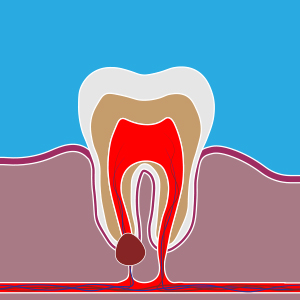 And When to Seek Endodontic Care
And When to Seek Endodontic Care
A dental abscess is a painful infection around the tooth’s root or gums, often due to untreated decay or injury. Abscesses require immediate attention to avoid complications, as the infection can spread, causing discomfort and health risks.
What Is a Dental Abscess?
A dental abscess is a pocket of pus caused by bacterial infection. This infection typically originates from untreated cavities, cracked teeth, or gum disease, allowing bacteria to enter the pulp and spread to surrounding tissues. An abscess can form in different parts of the tooth structure, each requiring specialized treatment to eliminate the infection and relieve pain.
Types of Dental Abscesses
- Periapical Abscess: This type of abscess occurs at the tip of the tooth’s root, often due to a deep cavity or injury. The bacteria penetrate the pulp chamber, resulting in infection that leads to swelling and pain around the root.
- Periodontal Abscess: This abscess forms in the gum tissue adjacent to a tooth root, usually due to gum disease or a trapped foreign object, like food, between the tooth and gums.
- Gingival Abscess: This less common type occurs only in the gum tissue, often resulting from injury or a foreign object embedded in the gum, without necessarily affecting the tooth or its root.
Symptoms of a Dental Abscess
Abscesses can be excruciating and often present with the following symptoms:
- Severe, throbbing pain that may radiate to the jaw, neck, or ear
- Swelling and redness in the face or gums near the affected tooth
- Sensitivity to hot, cold, or pressure when chewing
- Fever and a general feeling of unwellness
- Swollen lymph nodes under the jaw or in the neck
- Foul taste or odor if the abscess ruptures
If you experience these symptoms, seeking prompt dental care is essential. Left untreated, a dental abscess can lead to serious complications, such as infection spreading to other parts of the body.
Endodontic Treatment Options
- Root Canal Therapy: For periapical abscesses, root canal treatment is the most effective way to remove the infection while preserving the natural tooth. During the procedure, the endodontist removes the infected pulp, cleans and disinfects the root canal, and fills it with a biocompatible material to prevent further infection. A crown is then placed to restore the tooth’s structure and strength.
- Drainage and Cleaning: If the abscess has caused significant swelling, the endodontist may make a small incision to drain the pus and relieve pressure. This process helps to alleviate pain and allows antibiotics to work more effectively.
- Periodontal Treatment: For periodontal abscesses, the endodontist or periodontist may perform a deep cleaning to remove plaque and tartar, which can alleviate gum inflammation and help control the infection.
- Antibiotics: Antibiotics are often prescribed to help eliminate the infection, especially if it has spread beyond the tooth. However, antibiotics alone cannot cure the abscess—targeted dental treatment is essential.
Don’t Delay, Call For An Appointment
Dental abscesses are serious infections that require prompt endodontic care to prevent complications and preserve your oral health. Through root canal therapy or other treatments, endodontists can effectively address the infection, relieve pain, and restore your tooth’s health. If you suspect you have an abscess, don’t wait, call us for an appointment—early treatment can make all the difference in saving your tooth and preventing the infection from spreading.





Comments are closed.